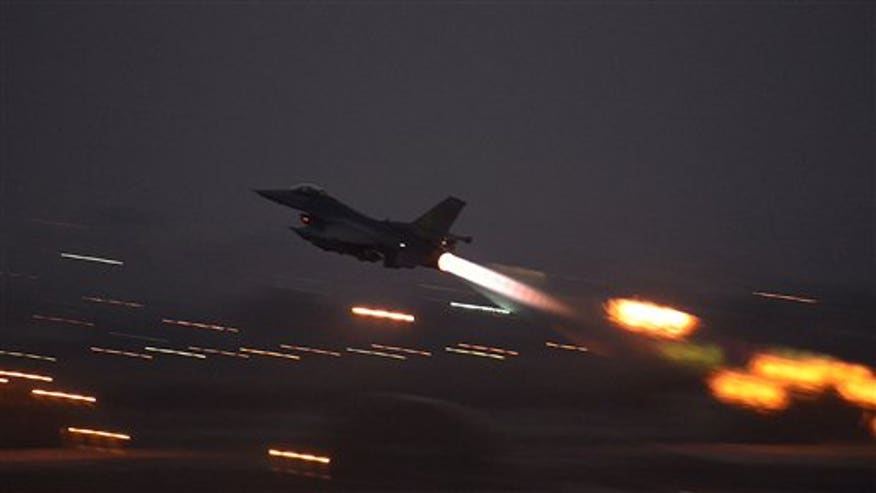
In this image provided by the U.S. Air Force, an F-16 Fighting Falcon takes off from Incirlik Air Base, Turkey, as the U.S. on Wednesday, Aug. 12, 2015, launched its first airstrikes by Turkey-based F-16 fighter jets against Islamic State targets in Syria. (Krystal Ardrey/U.S. Air Force via AP))
The U.S. military is pulling its Patriot missiles from Turkey this fall, the U.S. Embassy in Ankara announced Sunday.
The Patriot missiles "will be redeployed to the United States for critical modernization upgrades," according to a statement from the U.S. Embassy in Turkey. "This decision follows a U.S. review of global missile defense posture."
"The U.S. and NATO commitments to the defense of Allies - including Turkey - are steadfast," the statement said.
The U.S. military has deployed Patriot missiles along the Turkey-Syria border since 2013 along with a ground force of 300 U.S. Army soldiers to operate them, protecting Turkey from potential Syrian missiles.
The decision to pull the missiles has been "long planned" and is not a response to Turkey's unannounced massive airstrike against a Kurdish separatist group in northern Iraq on July 24, a State Dept. official said. The strike endangered U.S. Special Forces on the ground training Kurdish Peshmerga fighters, angering U.S. military officials. The U.S. military was taken completely by surprise by the Turkish airstrike, which involved 26 jets, military sources told Fox News.
Patriot missiles have been upgraded in recent years to shoot down ballistic missiles, in addition to boasting an ability to bring down enemy aircraft. The U.S. military has deployed these missiles along Turkey's border with Syria.
When a Kurdish journalist asked the Army's outgoing top officer, Gen. Raymond Odierno, about the incident over northern Iraq at his final press conference Wednesday, Odierno replied: "We've had conversations about this to make sure it doesn't happen."
The Kurdistan Workers Party, or PKK, has been listed as a foreign terrorist organization by the U.S. State Department. It is influenced by Marxist ideology and has been responsible for recent attacks in Turkey, killing Turkish police and military personnel. A separate left-wing radical group was responsible for attacking the U.S. Consulate in Istanbul last week.
State Department and Pentagon officials have said in recent days that Turkey has a right to defend itself against the PKK.
A senior military source told Fox News that Turkey is worried about recent gains by Syrian Kurds, some affiliated with the PKK. But the group is seen as an effective ground force against ISIS, helping pinpoint ISIS targets for U.S. warplanes.
The Turks, however, worry Syrian Kurds will take over most of the 560-mile border it shares with Syria.
Currently, ISIS controls a 68-mile strip along the Turkey-Syria border, but Turkey does not want Kurdish fighters involved in the fight to push out ISIS from this portion of the border because it would enable the Kurds to control a large swath of land stretching from northern Iraq to the Mediterranean. Right now Syrian Kurds occupy both sides of the contested 68-mile border controlled by ISIS.
Of the 30 million Kurds living in the Middle East, 14 million reside in Turkey. They are one of the world's largest ethnic groups without its own country.
Despite Turkey being listed among the 62-nation anti-ISIS coalition, it has yet to be named as a country striking ISIS in the coalition's daily airstrike report.
A week ago, after months of negotiations, the U.S. Air Force moved six F-16 fighter jets to Incirlik Air Base in Turkey from their base in Italy and several KC-135 refueling planes. Airstrikes against ISIS in Syria soon followed.
The decision to allow manned U.S. military aircraft inside Turkey came days after an ISIS suicide bomber killed dozens of Turkish citizens.
Part of Turkey's reluctance to do more against ISIS is because Turkey wants the U.S. military to take on the regime of Syrian president Bashar al-Assad. But that is not U.S. policy.
"We are not at war with the Assad regime," Pentagon spokesman Capt. Jeff Davis said recently.
The animosity between Turkey and Syria goes back decades. In 1939, Turkey annexed its southern most province, Hatay, from Assad family land. Syria has never recognized the move and the two countries have been at odds ever since.
"If needed, we are prepared to return Patriot assets and personnel to Turkey within one week," a defense official told Fox News.



No comments:
Post a Comment